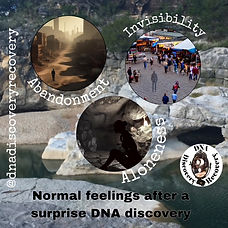
DNA Discovery Recovery
It’s the past that tells us what we are, without it we lose our identity.
~Stephen Hawking





Welcome all NPE's and MPE's. What's that you ask? NPE stands for Not Parent Expected or Non-Paternal Event and MPE stands for Misattributed Paternal Event. Both terms are used to identify those of us that do a DNA test and have a surprise discovery that our dad is not our dad.
A surprise DNA discovery can result in shattered trust, a breakdown of family relationships, a broken heart, a defeated view of the world, an overwhelmed nervous system, unending grief and a fractured identity.
However, a DNA discovery can be the start of a journey of discovering who you really are on a deeper level. It can lead to finding your own authenticity and voice. Sure, it will be filled with a rollercoaster of emotions, questions, and confusion. It won't be easy, but there are resources and support. There are many, many others that are going through this same journey as you. Don't isolate yourself. Don't avoid the journey. Don't blame or shame yourself.
Please take your time to explore this website, which offers a plethora of information and resources. Try out the courses that appeal to what you want to focus on. Schedule 1-on-1 coaching with me if you desire a custom healing journey.
DNA contributes to a person's medical & mental health, physical & psychological characteristics, and cultural & ethnic origin. When you find out your dad isn't your dad and your mom lied to you your whole life, suddenly nothing makes sense anymore.



Trauma Trail
Some special issues you may encounter after a surprise DNA discovery include:
-
Betrayal Trauma
-
Disenfranchised Grief
-
Breakdown of Family
-
Rejection of Family Members
-
Alienation
-
Moral Injury
-
Ambiguous Loss
-
Chronic Sorrow
-
Stigma
-
Internalized Shame
-
Genealogical Bewilderment
-
Complex-PTSD
-
Dissociation
-
Identity Crisis
If you experience any of these issues, it's important to get help from a specialized therapist or coach.
You may also have sleep problems, eating problems, heightened anxiety, depression, physical symptoms, hopelessness, trust issues, and the inability to focus on day-to-day life.





